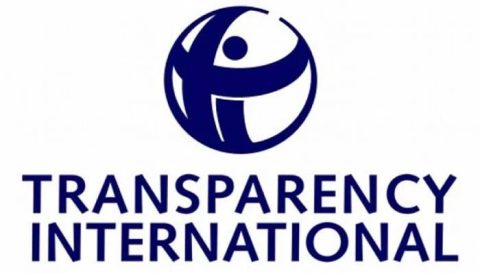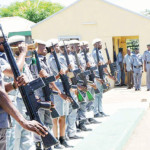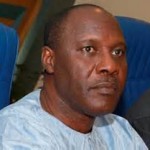Defence Sector Secrecy: CISLAC, TI Seek Global Standard Practice
Featured, Latest Headlines, News Across Nigeria Saturday, July 12th, 2025
(AFRICAN EXAMINER) – Against the backdrop of persisted alledged corruption and secrecy shrouding Nigeria’s defence sector and amidst escalating security threats, Civil Society Legislative Advocacy Centre (CISLAC) and Transparency International in Nigeria, have demanded establishment of guidelines for separating confidential from non-confidential information in line with global best practices.
The organizations posited that such guidelines should be similar to the Global Principles on National Security and the Right to Information.
“We demand adoption of global principles and standards for public disclosure of critical information about the defence sector, including defence budgets, competitive contracting, defence income and foreign assistance, disaggregated expenditures, and asset disposals”
Executive Director of CISLAC/Transparency International T-Nigeria, Mr. Auwal Ibrahim Musa Rafsanjani, stated this Thursday in Enugu during a media briefing to disseminate it’s South East Regional policy Brief titled: ‘Nigeria’s Defence Sector persistent Corruption Risk Amidst Escalating Security threats’
He frowned at the aged long unpopular method of classification of all Defence sector informations in Nigeria, which he noted, remains contrary to global best practices.
Represented by Jimoh Abubakar, Programme Manager CISLAC, Rafsanjani, equally stressed the need to strengthen civilian oversight of the defence sector, both in the legislature and the administration.
Our correspondent reports that CISLAC produced the Regional policy brief document in partnership with transparency international Defence and Security project.
Giving a background of the document, the CISLAC boss, explained that the document highlighted findings from the 2020 Government Defence Integrity Index (GDI) that are pertinent for a path to enhanced institutional resilience to corruption in Nigeria’s defence governance.
“It is based on a close reading of the GDI results for Nigeria, policy literature, recent news reports, and context and problem analyses conducted by the Civil Society Legislative Advocacy Centre (CISLAC) – the Transparency International (TI) national chapter in Nigeria”.
According to him, “rather than capturing information about one specific area of interest, the GDI captures information about the entire system encompassing defence governance.
“This means that findings apply to a range of actors (e.g., parliament, civil service, armed forces, media, civil society organisations, etc.), and a range of activities (e.g., policymaking, personnel management, financial management, procurement, operations).
“As a result, it extends well beyond the remit of what one organisation can address effectively”, adding that some of the key findings revealed that
“Nigeria’s defence and security sector is plagued with systemic corruption, a major hindrance to the effective provision of defence in a country facing serious security challenges.
“Corruption enmeshes the ever-increasing defence sector expenditure and procurement – activities with little oversight and transparency mechanisms.
“To remedy this, Nigeria’s defence institutions should prioritise transparency and access to information – with a focus on defence budgets and disaggregated expenditures.
“Strengthening accountability and civilian oversight will be critical to building and sustaining effective institutional resilience in the country’s defence sector
Some of the key observations in the document includes that “Nigeria, Africa’s most populous country, faces diverse corruption-induced security and financial issues.
“The ongoing corruption, fraud, financial mismanagement, and wider abuse of power within the defence and security sector have exacerbated Nigeria’s numerous security threats and threatened the country’s ability to mitigate escalating violent conflict within its borders.
“The failure of state security forces to protect local populations from terrorist violence has contributed to the proliferation of self-defence militias and the militarisation of local communities.
“Studies have identified corruption as an issue affecting Nigerian public finances, business investment, and standard of living. The decades-long struggle with systemic corruption places Nigeria at 145th place out of 180 countries in the 2023 Transparency International Corruption Perception Index (CPI), with minimal score changes over the lifetime of the index.
“Price water House Coopers finds that corruption could cost the country up to 37% of GDP by 2030 if not addressed. Despite acknowledging a decrease in the bribery of public officials in Nigeria since 2016, the United Nations Office on Drugs and Crime (UNODC) estimates that around 117 million bribes are paid in Nigeria yearly.
“These incidents highlight the pervasiveness of corruption in the country” the organization stated.
“The Nigerian state is also confronted with violent security threats. The country faces intense proliferation of small arms and light weapons.
“In 2021, it was estimated that Nigeria domiciled roughly 70% of illicit arms and weapons in West Africa. This has heightened insecurity, contributing to a nationwide rise in kidnapping, banditry, sexual and gender-based violence, killings, and other security issues..
“The north-eastern part of the country, which is an epicentre of terrorism in Nigeria, faces dire realities, owing to good and economic insecurity.
“Additionally, sexual forms of corruption (mostly involving women and girls) have increased. In terms of human security, violence continues with total fatalities for the last 19 months amounting to approximately 14,400.
“In 2021, militia-orchestrated organised political violence grew by 50% compared to 2020. Thirty per cent of this violence, some of which is cattle rustling, kidnapping for ransom, and pillaging of villages, is concentrated in Kaduna state.
“Nigeria’s armed forces are spread thin in efforts to defend national orders, as well as to manage internal conflicts and domestic protests.
“As of 2023, Nigeria had around 135,000 active-duty armed forces.15 However, the ratio of military personnel to population is approximately 1.1 per 1,000 people, far lower than the NATO average of 6 per 1,000 people or more than 20 military personnel per 1,000 people in countries facing conflicts, such as Eritrea, Israel, and Syria”
“This places Nigeria’s armed forces in a difficult position, as they face numerous security threats. The military is currently deployed on multiple fronts, fighting the Boko Haram terrorist activities in the northeastern corridors of the country, combatting banditry in north-west Nigeria, responding to communal crises in the Middle Belt and other hotspots around the country, and preventing piracy and oil theft in the Niger Delta area and the Gulf of Guinea”
“There are also reports of soldier desertion and allegations of corruption in the supply of armaments and safety gear, placing military personnel in danger whilst on the front lines.
“Much of the concern over corruption in the Nigerian armed forces stems from its sizeable but highly opaque military expenditure.
It noted that “From 2016 to 2022, Nigeria spent a total of over US$19.9 billion on security alone. The military budget was increased from US$2.4 billion in 2020 to a massive US$4.5 billion in 2021, slightly decreasing to US$3.2 billion in 2023.
“Despite the little increase in military success on the front line, Nigeria is the largest arms importer in sub-Saharan Africa, representing 16% of regional imports between 2019 and 2023.
“In its 2022 investigation, the Centre for Democracy and Development (CDD) revealed that about US$15 billion has been squandered through fraudulent arms procurement deals in the last 20 years. It also notes that these and other dealings of Nigeria’s defence and security institutions are shrouded in secrecy.
“The impact of defence procurement-related corruption extends well beyond the confines of the sector. Because of its impressive oil production capability, a fiscal account was created in 2004 by the Nigerian government to save revenues generated from the sale of oil that were in excess of the budgetary benchmark price.
“The aim of this Excess Crude Account (ECA) was to protect planned budgets against shortfalls due to fluctuations in oil prices.
“Under the Buhari. government, in power from 2015 to 2023, the Excess Crude Account fell from a high of US$2.1 billion in 2015 to a shocking US$376,000 in 2022.
“In December 2017, US$1 billion was withdrawn from this account with no transparency on allocation nor oversight. Of these US$1 billion, US$500 million was used to pay the US for 12 A-29s Super Tucano aircraft and the remaining US$500 million was unaccounted for and used in the remaining “security vote”.
“Human rights violations by state security forces compound the problem, with recent concerns over the increasing use of air strikes that have resulted in numerous civilian deaths, using technology and arms supplied by global powers.
” Nigerian military and security forces have also been implicated in violence against civilians, including sexual and gender-based violence.
“This has been particularly pernicious in north-eastern Nigeria in counter-terrorism operations, where military and security personnel have allegedly been involved in sexual forms of corruption linked to survival sex (mostly involving displaced women and girls), sex trafficking and conflict-related sexual violence against women and girls as well as men and boys.
” Measures have been taken to hold security forces accountable for human rights violations, particularly through the Presidential Investigation Panel established in 2017.
“However, these measures did not yield the desired results, and impunity continues to be an ongoing problem among the armed force.
“CISLAC has also highlighted issues around personnel management in the armed forces, including faulty recruitment processes, inadequate human resources, and decentralised remuneration systems and structures.
“These reported irregularities in recruitment, appointment, deployment, remuneration and promotion across defence and security institutions pave the way for corruption.
“CISLAC stresses that inadequate technical expertise of some members of relevant defence and security committees in the National Assembly constitute a major barrier to the effective civilian oversight.
“This leaves the financial and operational management of the sector fully exposed to corruption risk and opaque practices.
“Financial management of the defence sector is severely constrained by the bypassing of existing, albeit limited rules, with the effect of institutionalising informal practices for the benefit of individuals rather than human security.
“Moreover, GDI data shows that external auditing of defence institutions is compromised by a lack of access to information and cooperation by the Ministry of Defence (MOD), which regularly refuses to submit documents in a timely fashion and bars auditors’ access to accounts.
“Furthermore, the existing legal provisions in the Nigerian Audit Act are outdated; thus, rendering the Office of the Auditor General for the Nigerian Federation operationally incapable of scrutinising the financial management of the sector.
The organization however, handed down some recommendations, saying “in partnership with TI-DS with support from the Ministry of Foreign Affairs of Netherlands, we demand continue support to national and sub-national stakeholder platforms that engage with the Nigerian government on key issues related to defence and corruption.
“This will allow civil society actors and the media to provide input into national security strategy discussions and implementing policies.
“Adoption of an internationally accepted range of exceptions for defence and security that can be used in the development of legal frameworks, specifically in the right to information (RTI) law or information classification systems.
“This is also important for regulations governing procurement transparency and budget transparency
“We demand adoption of global principles and standards for public disclosure of critical information about the defence sector, including defence budgets, competitive contracting, defence income and foreign assistance, disaggregated expenditures, and asset disposals” amongst others.
Related Posts
Short URL: https://www.africanexaminer.com/?p=103522






















